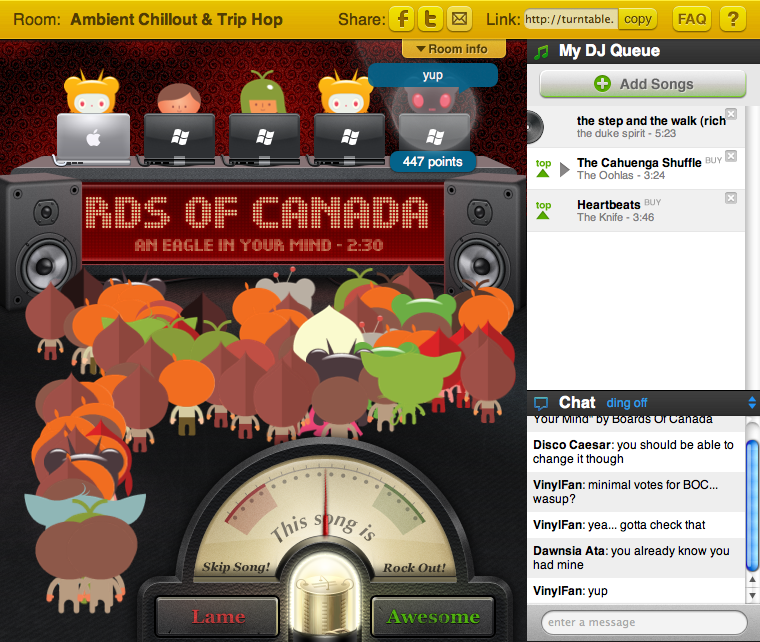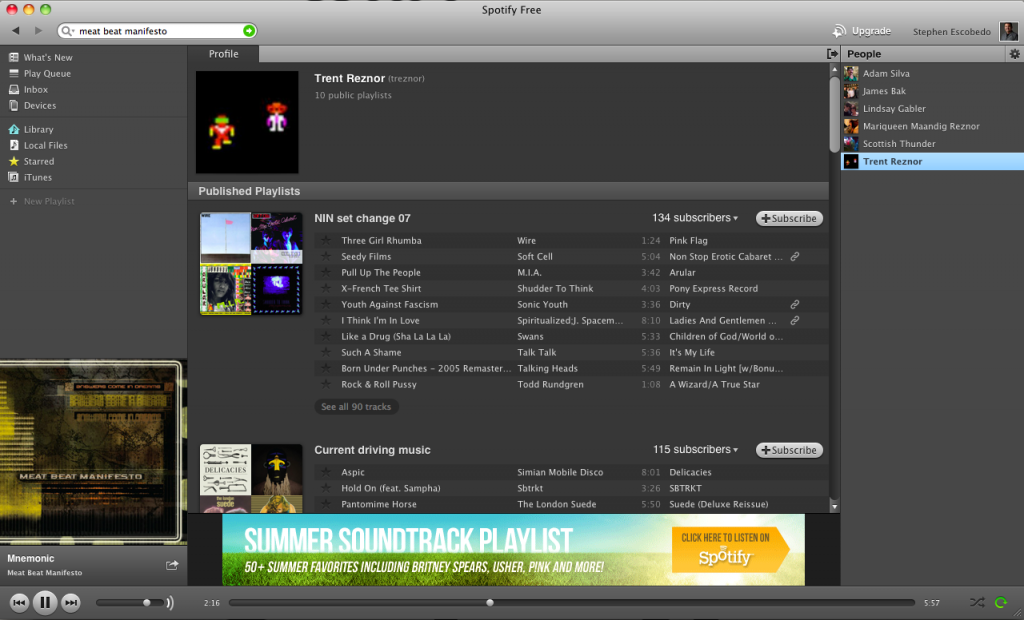Over the last month, the United States has been fortunate enough to be graced with two new services that look to change how we listen to and interact with music. I’m pleased to say both are great strides in the development of digital music services and, cooperatively, can potentially give major services like iTunes and Amazon a run for their money… and open up some new opportunities for Team Hideo.
The first of these two is turntable.fm, an (currently) invite-only social music service that acts as one part nostalgia, one part music discovery (if you know someone on Facebook who currently has access to turntable.fm and log in with your Facebook ID, you’re in). I was fortunate enough to get in and check it out, and it reminds me of the times back in 8th grade/freshman year of high school where friends would throw house parties… and the music would be provided by people like myself who brought mix CDs of hits and remixes to keep the party going. If the mix became too obscure, or the people weren’t feeling it, it was time to swap out the CD for a different mix.
Turntable.fm features a set of virtual party rooms where up to 5 DJs serve up tracks to listeners, one at a time. These rooms can range from themes such as 80’s New Wave or Rising Indie Artists to straight up free-for-alls where anything goes. Anyone signed up can be a DJ: it’s simply a matter of finding a room with an available spot or creating your own. When a DJ plays his or her track of choice, the artist and title is scrolled on their virtual platform for all to see. Here’s where it gets interesting: the audience can rate the song, either saying it’s “awesome” or its “lame” (sidebar: anyone who chooses “awesome” automatically has their avatar start nodding their head to the beat). If it’s too lame, the track is skipped and the next DJ steps up to bring the audience back on track. Added to this is a live chat stream displaying comments from all participants in the room, where people can discuss the track currently playing and share all kinds of interesting information. This is where turntable.fm can also be pretty addicting: I spent close to two hours not doing any work because I was wrapped up in a room where the DJs were jokingly ribbing each other about their choices, and then started trolling the room playing seemingly random tracks. Needless to say, there was much discussion going on about how Adam Lambert couldn’t possibly follow The Smiths, only to be followed by a remix of the original Super Mario Bros. theme.
What’s really nice about turntable.fm is that it can act as a music discovery service like Pandora, but with more interactivity. Jump into any room and you’re bound to discover something you’ve never heard before. Read the comments about the artist being played and learn more about them or similar artists. The cherry to this sweet interactive sundae is the ability to add/look up any currently playing track via a number of services; upon joining turntable.fm, I was able to add the song to my personal turntable queue so I could use it when DJ’ing in the future, look it up on iTunes, Last.fm, or the next service I’m about to talk about: Spotify [at the time of writing, songs can also be looked up and added to Amazon MP3 and the streaming service Rdio].
Spotify has been the talk of the internet for several years ever since it debuted in the UK, and it finally came stateside last week to much celebration (of note, I’ve been a bit jealous of Hideo‘s Mike McKellar, who went across the pond for work and immediately fell in love with Spotify. HAHA! I’ve finally got it now, you wanker). Looking to take a chunk of the iTunes empire in the online music world, Spotify monetizes the digital music world via low-cost subscriptions as opposed to pay-per-track and -album purchases. Its cloud-based network allows any user to find virtually any track and start listening immediately. Its user interface and player is similar to iTunes, which allows you to manage your own local library of MP3s/AACs in addition to your streaming library of music. You might be saying, “so its iTunes with a subscription service?”… and you would be right about that, except Spotify brings its own social network, along with slick integration to existing social networks, to the table to make it truly stand out. Intergration with Last.fm allows you to keep in touch with your community over there by scrobbling everything you listen to in Spotify. Like the song you’re currently listening to? Immediately share it on Facebook or Twitter with a link to listen to the track. Have friends that also have Spotify? Share and listen to playlists amongst each other. Discover a new techno album that your glowstick-wielding and Spotify-using friend might like? Share the entire album instantly with him or her.
Spotify is available in the U.S. in three tiers: the first is Spotify Free, an invite-only free service that gives you unlimited streaming for the promotional period. When the period ends, each free user is allotted 10 hours of streaming a month. Spotify Unlimited allows for unlimited streaming and features no ads for $4.99 per month. Spotify Premium sets you back $9.99 per month, and allows you offline access to streaming tracks, mobile device streaming, and exclusive content in addition to ad-free unlimited streaming. Extremely reasonable, in my opinion.
So why are turntable.fm and Spotify great together? Some have said Spotify lacks as a music discovery device, and turntable.fm is the perfect choice to fill that void. Spend a couple hours in some turntable.fm rooms of your choice, bookmark and add new tracks to your Spotify library, and share that amongst your friends and networks. Not to mention both are breaking ground by being new, interactive music services that aim to solve music piracy with social entertainment and integration and forward-thinking business models.
While both services are admittedly great, there are some areas that can be improved upon in Spotify before I fully move on from iTunes. One major element Spotify is lacking is podcasts. I’ve become an avid podcast listener over the last year and would love to see some support for streaming and/or downloading podcasts. In the same vein, audiobooks and internet radio would also be welcome additions to Spotify. Also, Spotify is limited to MP3 and AAC codec support. Audiophiles surely want to pull in their FLAC/lossless collections, so expanding their supported file types would be a huge boost. However, Spotify is a service still finding its footing in the music market, coming off lengthy negotiations with the major US record labels to finally launch here in the states. I don’t expect Spotify to start supporting everything immediately; these things may come after an established user base and active user feedback.
And finally, bringing it all back to this website, what does this mean for Hideo? Lots of possibilities. We could hold listening parties (or just parties in general!) for our new releases over at turntable.fm, with Team Hideo DJ’ing the room with our new tracks plus personal selections of music from video games and anime that inspire us. Live discussions about show song choices, possibilities, and suggestions. Hear something new from us that you want to save for later? Add it to your Spotify library and share it with friends. If Team Hideo are all on Spotify, we could take requests from people via shared playlists, or, alternatively, share playlists of both the original and Team Hideo versions of songs featured in Hideo. And that’s just off the top of my head.
The future’s definitely looking bright on the digital horizon for music.











Lolz. I almost spit out me afternoon tea when I read that…ya wanker! =)